Unit2_passage_english_a
剑桥少儿英语二级上unit2

学习过程中的注意事项
注重听说训练:多 听多说,提高英语 听说能力
培养兴趣:通过游 戏、歌曲等方式激 发学习兴趣
坚持练习:每天安 排一定的学习时间 ,养成良好学习习 惯
家长参与:鼓励家 长与孩子一起学习 ,创造良好的英语 学习环境
学习后的巩固和提高
练习听说能力: 通过模仿、跟 读、对话等方 式,提高听说
培养孩子的英语 语法和词汇能力, 使他们能够掌握 常用的英语单词 和短语。
剑桥少儿英语二级的教学内容
掌握约370个词汇和短语
学习基本语法和句型结构
提高听、说、读、写四项 技能
培养英语学习兴趣和实际 应用能力
剑桥少儿英语二 级unit2的课程
设置
主题:动物
unit2的主题
词汇的构成和 用法
了解现在进行时的基本概念和 用法
如何学习剑桥少 儿英语二级 unit2
学习前的准备
了解剑桥少儿英语二级unit2的学习内容和要求
准备学习材料,如教材、练习册、听力材料等
制定学习计划,安排每天的学习时间和进度 确定学习方法和策略,如听说读写各项技能的练习、记忆单词和语法规则 等
针对评估结果的改进措施
针对听力理解:加强听力训 练,提高孩子的听力水平
针对阅读理解:增加阅读量, 提高孩子的阅读速度和阅读 理解能力
针对口语表达:提供更多的 口语练习机会,鼓励孩子多 说多练
针对写作能力:加强写作训 练,提高孩子的写作技巧和
表达能力
感谢您的观看
汇报人:XX
完成课程配套练 习和测试
参加剑桥少儿英 语等级考试
评估结果的分析和反馈
分析评估结果:根据考试成绩和其他评估指标,分析学生的学习状况和 需要改进的方面。
新标准高职公共英语实用综合教程(第二版)unit2TextA

Question:(P.20) What suggestions do you have for environmental protection?
Hints
The environment can be protected if (1) people understand the importance of environmental protection; (2) everyone makes his or her own surroundings clean; and (3) we create a beautiful environment for people to protect.
Unit 2 Our Living Environment
Warm-up Listening and Speaking Text A Grammar Tips Text B Comprehensive Exercises Practical Reading and Writing
《实用综合教程(第二版)》第2册电子教案
《实用综合教程(第二版)》第2册电子教案
Unit 2 Our Living Environment
Listening
Speaking
II. Speaking
Talk about your ideas of an ideal job based on the following questions.
dramatic change [drə'mætɪk]翻天覆地的变化,戏剧化的改变 consumption patterns [kən'sʌmpʃən]消费方式/结构 environmental consciousness [ˈkɒnʃəsnəs]环保意识
2021_2022学年新教材高中英语Unit2ExploringEnglishSectionASta

4.reflect D.a loud noise or a signal that warns people of danger or of a
problem
5.creativity E.to show or be a sign of the nature of sth.or of sb.’s attitude or
Does it matter if an increasing number of people speak the same language?I would have thought the other way around(相反) although I have never accepted the argument③ that if only we all understood each other better,there would be fewer wars.Ask the people of India (where many of them speak at least some English) and Pakistan(the same situation with India)...
If we all speak English,will we then all start eating McDonald’s burgers?Surely not.If English becomes more dominant(占主导地位的),will it kill other languages?I doubt it.When I travel in Africa or Asia,I am always surprised by how many people can speak not only their own language but often one or more other related languages,as well as English and perhaps some French or German as well.
Basic english 2
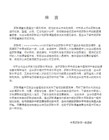
While I was shopping in a large department store, I stopped in the book department. I spent at least 30 minutes there because I was looking for a number of books which I wanted to give to people as presents. I found quite a few of them so I put them in a pile beside me. I was standing there and reading the books quietly, choosing some and putting some others back, when an elderly lady came up to me,. pushed a book at me and said: “ I’ll taБайду номын сангаасe this.” I replied to her, “Go ahead, madam, but you had better pay for it first.” Then I realized that because I was standing by a great pile of books, she thought I was a shop assistant. I was starting to explain when she interrupted me and complained about the service in the shop. I said nothing and walked away. the songs compensates for the breaks in the action
人教版高中英语选择性必修第三册精品课件 Unit 2 Section C

The pandemic,and especially remote work,has created new opportunities to work too hard.The W.H.O.director-general,Dr.Tedros Adhanom Ghebreyesus,noted that teleworking has blurred the line between work and home and that people who have survived layoffs(裁员) at struggling businesses have ended up working longer hours.One survey found an overwhelming majority of American employees have shortened,postponed or canceled vacations during the pandemic.
解析 段落大意题。根据倒数第二段前两句“The red flags about overwork have been waving...in 2005 and the nuclear accident at Three Mile Island.”可 知,本段主要讲述了多年来世界各地都承认过度劳累会带来危险。故选C 项。
ⅠⅡⅢⅣⅤⅥ
4.Where can you most likely find this passage? C A.In a college textbook of medicine. B.In a guidebook for workplace newcomers. C.In the “opinion” column of a newspaper. D.In the brochure of a Japanese company. 解析 推理判断题。本文论述了长时间工作已成为“严重的健康风险”,因此 文章很有可能出自报纸上的“观点”栏目。故选C项。
2021_2022学年新教材高中英语Unit2ExploringEnglishSectionⅠSta
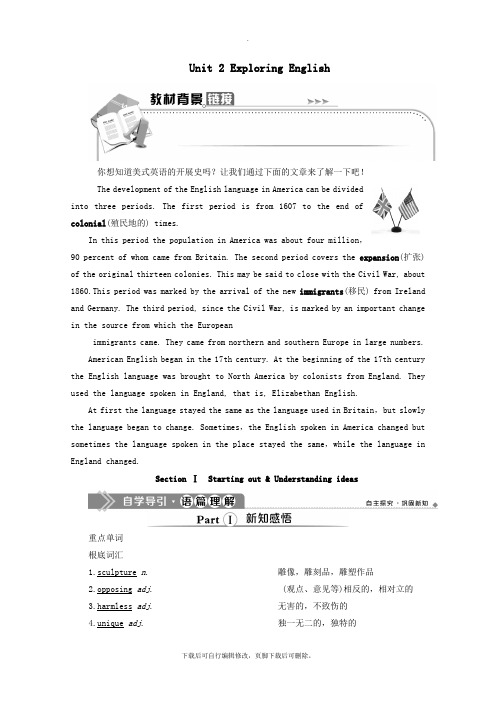
Unit 2 Exploring English你想知道美式英语的开展史吗?让我们通过下面的文章来了解一下吧!The development of the English language in America can be dividedinto three periods. The first period is from 1607 to the end ofcolonial(殖民地的) times.In this period the population in America was about four million,90 percent of whom came from Britain. The second period covers the expansion(扩张) of the original thirteen colonies. This may be said to close with the Civil War, about 1860.This period was marked by the arrival of the new immigrants(移民) from Ireland and Germany. The third period, since the Civil War, is marked by an important change in the source from which the Europeanimmigrants came. They came from northern and southern Europe in large numbers.American English began in the 17th century. At the beginning of the 17th century the English language was brought to North America by colonists from England. They used the language spoken in England, that is, Elizabethan English.At first the language stayed the same as the language used in Britain,but slowly the language began to change. Sometimes,the English spoken in America changed but sometimes the language spoken in the place stayed the same,while the language in England changed.Section ⅠStarting out & Understanding ideas重点单词根底词汇1.sculpture n. 雕像,雕刻品,雕塑作品2.opposing adj. (观点、意见等)相反的,相对立的3.harmless adj. 无害的,不致伤的4.unique adj. 独一无二的,独特的5.alarm n. 警报器;闹钟拓展词汇6.behavior n.行为,举止→behave v.表现,举止7.confusing adj.令人困惑的→confuse v.使困惑→confused adj.感到困惑的→confusion n.困惑,疑惑8.reflect v.显示,反映→reflection n.反映,思考,反射9.creativity n.创造性,创造力→creative adj.有创造性的,有创造力的→creation n.创造力,创造10.visible adj.看得见的,可见的→invisible adj.看不见的重点短语1.the__number__of ……的数量2.around__the__world 全世界3.for__example 例如4.speak__of 说起;说到5.burn__up 烧毁,烧尽6.fill__in/out 填充;填写7.wind__up 摇动(把手等);使(活动、会议等)完毕重点句型1.have trouble doing sth.做某事费力:Have you ever asked yourself why people often have__trouble__learning__English(在学习英语方面有困难)?2.neither引导倒装句:This made me realize that there’s no egg in eggp lant either.Neither__is__there__pine__nor__apple__in__pineapple(菠萝里面也没有松树和苹果).3.That/This is why...这/那是……的原因(why引导表语从句):That__is__why(这就是……的原因) when the stars are out, they are visible, but when the lights are out, they are invisible.ⅠRead the text and match the main idea of each part.Part 1(Para.1) A.Give some examples to discuss the topic.Part 2(Paras.2-6) B.Conclude the topic of the passage.Part 3(Paras.7-8) C.Lead to the topic of the passage.答案:Part 1:C;Part 2:A;Part 3:BⅡRead the text carefully and choose the best answer according to the text.1.The words photo and homesick were mentioned ________.A.to show how crazy it is to learn EnglishB.to tell us the differences between their usagesC.to analyze the formation of the wordsD.to share how to learn a crazy language2.How does the author develop the passage?A.By providing examples.B.By making comparisons.C.By following the way of spelling.D.By following the order of importance.3.Why does the author say “English was invented by people〞?A.Because the English words show everything around us.B.Because the language helps us communicate with others.C.Because the language proves how creative human being is.D.Because the English words are unique in the world.4.The author’s purpose to write the passage is ________.A.to share the difficulty in learning different English words wellB.to show how interesting and creative the language of English isC.to instruct how to spell difficult English words correctlyD.to analyze the reason for inventing the language of Englishbehavior n.行为;举止(教材P15)If harmless actions are the opposite of harmful actions, why are shameless and shameful behaviors the same?如果harmless(无害的)的动作是harmful(有害的)的动作的反义词,为什么shameless(无耻的)的行为和shameful(可耻的)的行为是一样的呢?(1)behave well/badly to/towards sb.对某人表现良好/糟糕behave oneself 守规矩,表现得体(2)wellbehaved adj. 表现好的badlybehaved adj. 表现差的(3)behavio(u)r n. 行为;举止;习性①Many parents are worrying about the effect of smartphone on their children’s behavior.很多父母担忧智能手机对孩子的行为所产生的影响。
《Exploring-English》Section-Ⅱ2
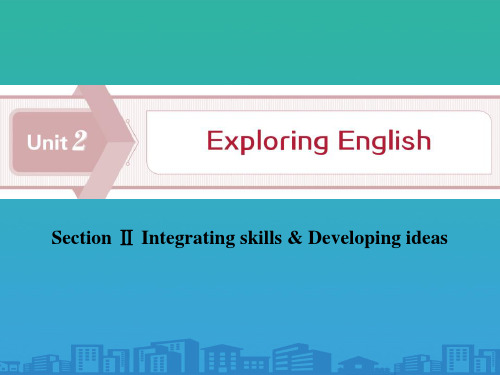
评论 靴子 区域 事实上,实际上 消极的,负面的
栏目 导引
Unit 2 Exploring English
拓展词汇 11. __ex_c_h_a__n_g_e__ n.(学生、教师等的)互访,交换 v.交换,互换, 兑换→change v.& n.改变 12. _a_p__a_rt_m__e_n_t_ n.一套住房,公寓套房→apart adj.分离的, 隔离的 adv.分开地,成碎片→part n.部分,角色,零部件 13. __f_o_r_w_a_r_d___ adv.向前→backward adv.向后
地铁 词汇 相当,颇 上下文,语境 提醒,使……想起
栏目 导引
Unit 2 Exploring English
6. __c_o_m__m_e_n_t__ n. 7. ____b_o_o_t____ n. 8. ___s_e_c_t_io_n___ n. 9. ___a_ct_u_a_l_ly___ adv. 10. __n_e_g_a_t_iv_e___ adj.
栏目 导引
Unit 2 Exploring English
③I am going to travel abroad, so I want to exchange some RMB __fo_r__ dollars in the bank. 我要出国旅游了, 所以我想去银行把一些人民币兑换成美金。 ④(牛津词典)He’s giving her French lessons __i_n__ exchange for her teaching him English. 他教她法语,她教他英语,互教互学。
of the English we learn in the classroom is rather different from
人教版高一英语必修一unit2--. PPT课件 图文
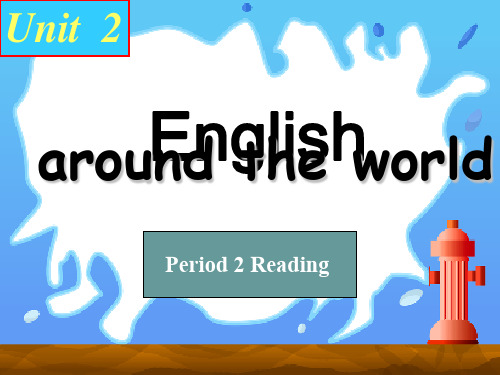
eraser gas apartment elevator honour colour movies subway
Pre-reading
Why do people all over the world want to learn English?
Tourism
Internet website
why?
过来
come across 偶然遇到
come about 发生
come true 实现
come back 回来, 恢复记忆
comcome out come in
出现,出版,开花 进来
come over 过来,顺便来访
随着时间的推移
5. Actually = in fact = as a matter of fact 实际上,事实上
each other but not everything.
Para 3 English is changing over time.
Para 4 Para 5
The two big changes happened in English spelling.
English is spoken as a foreign or second language in many countries.
Ireland
F G
the USA
South Africa E
D
Australia
New Zealand C
Canada
This unit seeks to give us a better understanding of how English developed and how it is spoken in the world.
大学体验英语综合教程课堂辅导Book 4Unit 2-passage a-词汇充电交际实战

v. make or become different, but without changing into something 改变;变更:I didn’t recognize him because he had altered so much. 我没认出他来,因为他变了许多。
【联想】alterable adj. 可改变的,可修改的。
alteration n. 变更;修改;改变。
alternate v. 变更;轮流adj.交替的;轮流的。
alternative n. 可供选择的事物。
【短语】enter into a bond with 与⋯订契约2 awaitv. ①(of person)wait for (sb./ sth.) ( 指人) 等候,等待( 某人/ 某物):He was awaiting for murder. 他在等待凶杀案的审判。
②be ready or waiting for (sb./sth.) 准备以待,期待( 某人/ 某物):A surprise awaits you. 有惊喜等着你。
【联想】近义词wait v. 等待。
【考题】Would you please _______ me to get ready?A. waitB. awaitC. wait forD. await for【详解】答案C。
句意:能等我准备好吗? await 是及物动词,wait 是不及物动词,await=wait for, 可说wait for sb. to do 但不可以说await sb. to do。
【短语】await sb. 等待某人3 compelv. ①make (sb.) do sth.; force 使( 某人) 做某事;强迫:He was compelled to resign. 他被迫辞职。
②by force or pressure; make necessary 强夺,强求:You can compel obedience, but not affection. 可以逼人服从,却无法逼人生爱。
新外研版高中英语必修一Unit2ExploringEnglish知识点总结
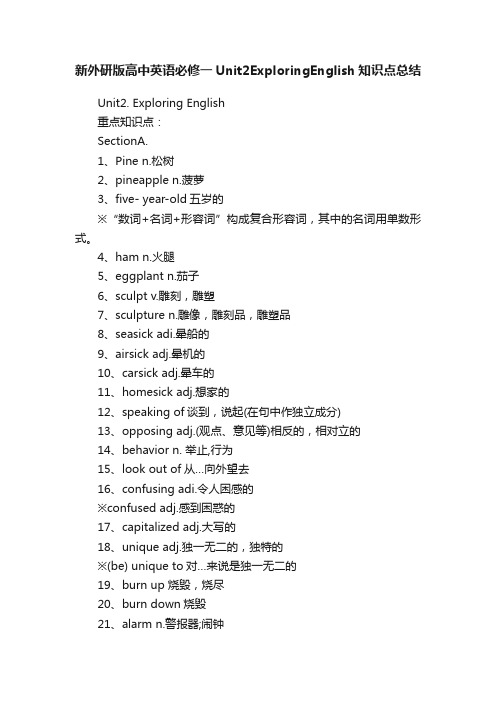
新外研版高中英语必修一Unit2ExploringEnglish知识点总结Unit2. Exploring English重点知识点:SectionA.1、Pine n.松树2、pineapple n.菠萝3、five- year-old五岁的※“数词+名词+形容词”构成复合形容词,其中的名词用单数形式。
4、ham n.火腿5、eggplant n.茄子6、sculpt v.雕刻,雕塑7、sculpture n.雕像,雕刻品,雕塑品8、seasick adi.晕船的9、airsick adj.晕机的10、carsick adj.晕车的11、homesick adj.想家的12、speaking of谈到,说起(在句中作独立成分)13、opposing adj.(观点、意见等)相反的,相对立的14、behavior n. 举止,行为15、look out of从…向外望去16、confusing adi.令人困感的※confused adj.感到困惑的17、capitalized adj.大写的18、unique adj.独一无二的,独特的※(be) unique to对…来说是独一无二的19、burn up 烧毁,烧尽20、burn down烧毁21、alarm n.警报器;闹钟22、go off(警报器等)突然发出巨响23、reflect v显示,反映24、creativity n.创造性,创造力25、visible adj.看得见的,可见的26、wind up给(机械)上发条;使(活动、会议等)结束原文长难句分析:1、Have you ever asked yourself why people often have trouble learning English?--- why引导宾语从句,作ask的宾语※have trouble(in) doing sth.做某事有困难2、Neither is there pine nor apple in pineapple.---“Neither/Nor+助动词/连系动词be/情态动词+另一主语表示上述否定情况也适用于该主语。
新核心大学英语B版 读写教程 基础级 Unit 2
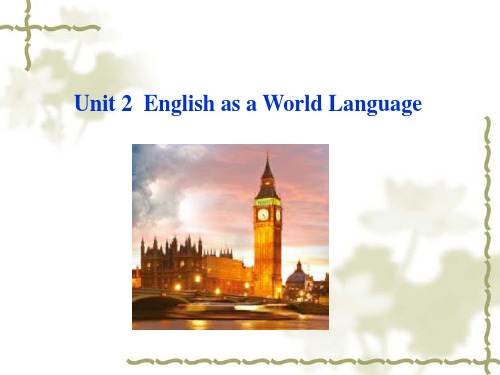
His charm soon won him affection and popularity the universal popularity of American movies popular adj. being widely admired or accepted
e.g.
巧克力总是深受年轻人的喜爱。
1) How many people are trying to learn English all over the world? A. 2.1 billion. B. 12 million. C. 2.5 million. D. 2 billion. 2) _______ is the language of science. A. English B. Mathematics C. Native language D. Another language 3) According to the video, in the future, English can serve as . A. the world’s second language B. the language of emotions C. the language of problem solving D. the native language
Part I Approaching the Topic Part II Understanding the Text
Part III Integrated Tasks
Part IV Writing Strategy
Part I Approaching the Topic Task 1 Brainstorming Task 3 Watching and Retet 2 》Part II 》Main Reading
unit-2-English-around-the-world-(课文)
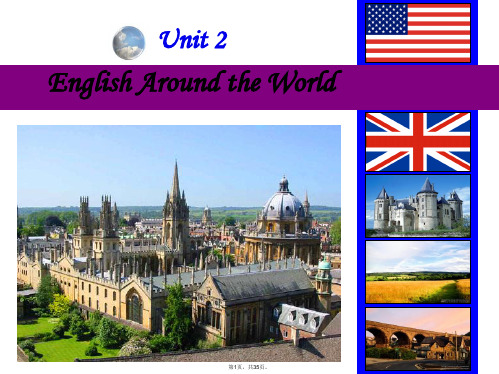
Summary of the reading :
English is a language spoken_ all over the world. but at first the English spoken in England between about AD450 and 1150 was very__d_if_fe_r_e_n_t_from the English spoken today. it was basedmore on German thanthe English we speak now, later English became lesslike German because new settlers enrich_e_d the English language and its vocabulary. So by the 1600s Shakespeare was able to make use of a wider vocabulary than ever before. finally by the 19th century the language was settled because dictionaries were written.
第22页,共35页。
Time
How is English developed?
Between about
Spoken in _En_g_la_n_d___ and based
A__D_45_0__ and 1_1_5_0__ more on G_e_r_m_a_n.
Between about A__D_8_00_and _11_5_0_
South Africa
第11页,共35页。
实用综合教程(第二版)1-Unit_2__课后答案
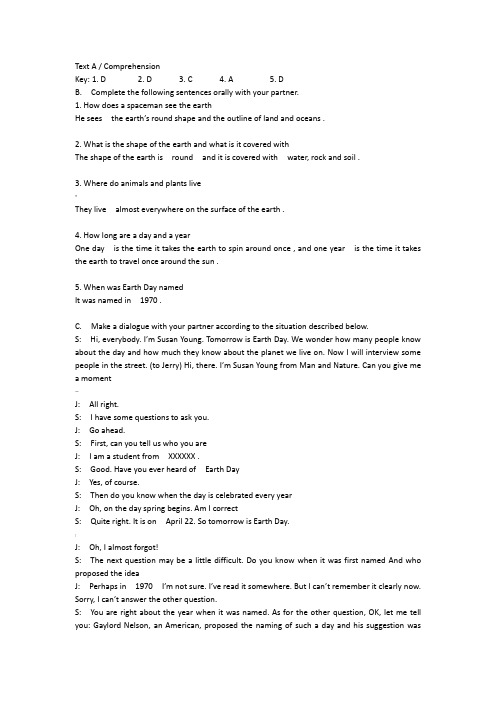
Text A / ComprehensionKey: 1. D 2. D 3. C 4. A 5. DB. Complete the following sentences orally with your partner.1. How does a spaceman see the earthHe sees the earth’s round shape and the outline of land and oceans .2. What is the shape of the earth and what is it covered withThe shape of the earth is round and it is covered with water, rock and soil .3. Where do animals and plants live*They live almost everywhere on the surface of the earth .4. How long are a day and a yearOne day is the time it takes the earth to spin around once , and one year is the time it takes the earth to travel once around the sun .5. When was Earth Day namedIt was named in 1970 .C. Make a dialogue with your partner according to the situation described below.S: Hi, everybody. I’m Susan Young. Tomorrow is Earth Day. We wonder how many people know about the day and how much they know about the planet we live on. Now I will interview some people in the street. (to Jerry) Hi, the re. I’m Susan Young from Man and Nature. Can you give me a moment—J: All right.S: I have some questions to ask you.J: Go ahead.S: First, can you tell us who you areJ: I am a student from XXXXXX .S: Good. Have you ever heard of Earth DayJ: Yes, of course.S: Then do you know when the day is celebrated every yearJ: Oh, on the day spring begins. Am I correctS: Quite right. It is on April 22. So tomorrow is Earth Day.;J: Oh, I almost forgot!S: The next question may be a little difficult. Do you know when it was first named And who proposed the ideaJ: Perhaps in 1970 I’m not sure. I’ve read it somewhere. But I can’t remember it clearly now. Sorry, I can’t answer the other question.S: You are right about the year when it was named. As for the other question, OK, let me tell you: Gaylord Nelson, an American, proposed the naming of such a day and his suggestion waslater accepted by the United Nations. My next question is: why can animals and plants live on the earthJ: They can live on it first because it is just the right distance from the sun . Living things need the sun’s warmth and light for life. They also must have enough water to live. The earth has plenty of water that covers most of its surface .S: The last question: what lies at the center of the earthJ: A ball of hard metal lies at the center of the earth.S: Very good. I think you know a lot about our mother earth. Thank you for your time.J: You are welcome. I’m glad to have taken part in your program. And I lik e your program very much .S: Thank you again! Goodbye!(J: Bye!Vocabulary Building / ExercisesA. Match each word with its proper Chinese meaning.B. Fill in each blank with a given word or expression in their right form.form inclu de at the center of call (one’s) attention toprotect as far as surface measure·1. I’ll help you as far as I can.2. He had included a large number of funny stories in the speech.3. These greenbelts protected / protect / have protected 500,000 acres of farmland against moving sands.4. The TV program is shown to call people’s attention to water pollution in China.5. A soft wind caused ripples on the surface of the lake.6. The children formed / have formed a circle around her.7. My mother measured / has measured / is measuring me for a new dress.8. The park lies at the center of the city.*Grammar Tips / ExercisesA. Fill in each blank with a proper preposition.1. He asked me whether the movie was based on a real story.2. The Beckhams traveled around China in 2011.3. You can look up the word in the dictionary.4. — Where are good potatoes grown—Good potatoes are grown in North China.5. —What’s this bottle made of—It’s made of china.'6. We are busy preparing for the exam.7. A new bridge is built over the river.8. He came into the classroom with a book in his hand.9. There is a lamp between the bed and the desk.10. Autumn is the best season of the year in Beijing.B. Complete each sentence with one of the prepositions given in brackets.1. The two countries are at war. (at / about / with)2. The rain was beating against the windows. (in / against / at)3. The train is ten minutes behind time. (behind / after / before)|4. There are many other people besides Tom at the party. (but / beside /besides)5. Who is he after (after / before / in)6. The policeman caught the thief by the arm. (at / by / with)7. The ball fell to the ground. (to / in / over)8. I am here only on business and I’ll leave soon. (under / on / with)9. There is a map of China on the wall. (for / like / of)10. Ten years passed and his son has grown into a young man. (like / into / to)C. Fill in each blank according to the Chinese given in brackets.1. She left the manager’s office with tears (哭着).(2. The boat sails on / down / along the river (河上).3. The manger will come back in a week (一周内).4. Christmas is celebrated in all (of) the Western countries (所有西方国家).5. We held an interesting party in the open air (在户外).Text B / ComprehensionA. Answer the questions according to the text.1. What is Earth Day aboutKey: It is about learning about and protecting the biodiversity on earth.?2. Who is the founder of Earth DayKey: The founder is Gaylord Nelson of the United States.3. How do people traditionally celebrate Earth DayKey: They traditionally celebrate the day with the ringing of bells, often bells of peace.4. What did Australians do on Earth Day to draw attention to air pollutionKey: They organized a large “carless” day.5. What have been the themes of China’s Earth Day;Key: Protection of geographic relics and scientific development and sustainable use of natural resources in China and all over the world.B. Read the sentences below and decide if they are true or false according to the text. Write T for true or F for false.1. When Earth Day was founded, it was only celebrated in the US.2. In 1972 Earth Day was made an international celebration by the UN.3. Earth Day reminds people of their responsibility for the common planet they share.4. The ringing of peace bells on Earth Day is practiced only in the West.5. In Kenya children plant trees on every Earth Day.[Key: 1. T 2. F 3. T 4. F 5. FComprehensive ExercisesA. Choose the best answer.(C)1. ________ the help of the guide dog, the old man ________ his son a visit.A. Under; spentB. With; tookC. With; paidD. Under; showed(A)2. Because ________ bad weather we had to have our physical education class in the classroom.A. ofB. it was:C. of theD. the(C)3. I often dream ________ my old friends.A. to seeB. seeingC. of seeingD. at seeing(C)4. ________ the end they succeeded in finishing the task ________ the end of June.A. At; atB. In; inC. In; atD. At; in(C)5. Can you translate the passage ________ EnglishA. withB. fromC. intoD. by~(D)6. We couldn’t help ________ when we heard the hero’s story.A. movingB. to moveC. to be movedD. being moved(A)7. Please pay twenty dollars for these, the dictionary ________.A. includedB. were includedC. includeD. including(A)8. When he became a famous poet he was ________ his early thirties.A. inB. atC. afterD. from(D)9. You ________ not smoke here. This is a public place.|A. could betterB. would betterC. should betterD. had better(D)10. The teacher shared the tasks ________ all the children in her class.A. toB. withC. byD. amongB. Fill in the blanks with the words given below.right March long people spring thanWhat and When Is Earth Day·When I proposed to name Earth Day, a global occasion to celebrate the wonder of life on our planet, I thought long and hard about what day to choose. It must be meaningful and must be accepted by people . When I came across the Vernal Equinox (春分), I immediately knew it was right . What could be better than the first day of spring when hearts and minds can join together with thoughts of peace and the awakening of the earth. So the first Earth Day was celebrated in San Francisco, on March 21, 1970. The United Nations later accepted the day as a yearly event for people all over the world. Each year the United Nations Peace Bell rings at the moment spring begins.C. Translate the following sentences into English, using the given words or phrases.1. 就我们所知,地球是人类可以居住的唯一星球。
高中英语Unit2课文语法填空 课文句子翻译人教版(2019)选择性必修第二册

人教版选择性必修第二册unit2课文语法填空+课文句子翻译Ⅰ.After reading the passage,please fill in the following blanks.Six months ago,Xie Lei boarded a plane for London to complete an exchange programme.She recalled that she 1._______(choose) the yearlong exchange programme with the2.______(ambitious) to set up a business in China after graduation.It was the first time that she3.__________(leave) her motherland.When she came to England,she lived with a host family,4._________ members always helped her.At first,she had to get used to living in a new country and learn how to use public transport and how to ask for things she didn’t know the English names for.Besides,she also had to face another challenge of the academic requirements.When writing an essay,she5._____(tell) by the tutor to acknowledge6.______other people had said if she cited their ideas,7.______he wanted to know her own opinions.She also found students’participation8._________(include) as part of the final result.9._________(lucky),after a few weeks,she could speak up in class on traditional Chinese art successfully.And she feels much more at home in the UK now.What seemed very strange before now appears quite normal.Now she has been involved in social 10.__________(activity) as well as studying hard!Ⅱ.请快速背诵下列课文原句1.这是她第一次离开中国。
2021_2022学年新教材高中英语Unit2ExploringEnglishStartingout
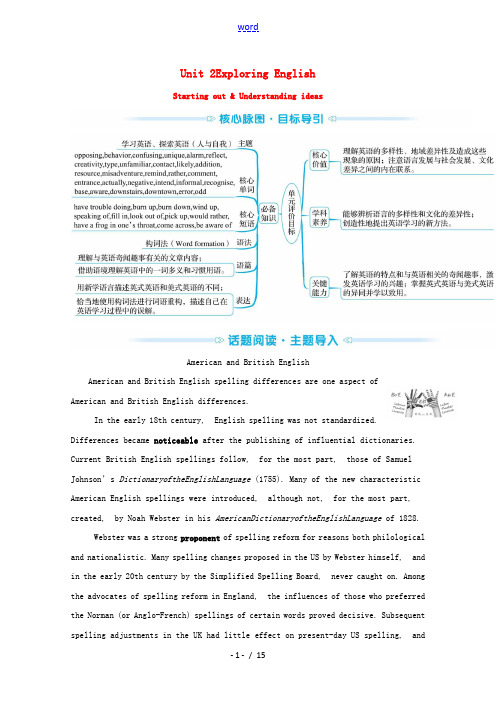
Unit 2Exploring EnglishStarting out & Understanding ideasAmerican and British EnglishAmerican and British English spelling differences are one aspect ofAmerican and British English differences.In the early 18th century, English spelling was not standardized. Differences became noticeable after the publishing of influential dictionaries. Current British English spellings follow, for the most part, those of Samuel Johnson’s DictionaryoftheEnglishLanguage (1755). Many of the new characteristic American English spellings were introduced, although not, for the most part, created, by Noah Webster in his AmericanDictionaryoftheEnglishLanguage of 1828.Webster was a strong proponent of spelling reform for reasons both philological and nationalistic. Many spelling changes proposed in the US by Webster himself, and in the early 20th century by the Simplified Spelling Board, never caught on. Among the advocates of spelling reform in England, the influences of those who preferred the Norman (or Anglo-French) spellings of certain words proved decisive. Subsequent spelling adjustments in the UK had little effect on present-day US spelling, andvice versa(反之亦然). While in many cases American English deviated in the 19th century from mainstream British spelling, on the other hand it has also often retained older forms.The spelling systems of monwealth countries, for the most part, closely resemble the British system. In Canada, however, while most spelling is “British”, many “American” spellings are also used. Additional information on Canadian and Australian spelling is provided throughout the article.[词海拾贝]1. noticeable adj. 明显的, 显著的2. proponent n. 倡导者3. deviate v. 偏离; 脱离4. retain vt. 保留5. resemble vt. 像[我学我思]1. catch on变得流行2. have little effect on对……影响很小3. on the other hand 另一方面4. What does the passage mainly tell us?It tells us the spelling differences between American and British English.5. What is the current British English spelling mainly influenced by?Samuel Johns on’s Dictionary of the English Language (1755).6. Who brought many spelling changes in the US?Webster.Ⅰ. 必备单词: 根据提示填写单词1. the title of the passage 这篇文章的题目2. sculpt a sculpture by hand 手工雕刻一座雕像3. a unique work of art 一件独一无二的艺术作品4. a smoke alarm一个烟雾警报器5. reflect the creativity of the human race反映人类的创造力6. a very creative student一个很有创造力的学生→create (v. ) a new product 创造一个新产品7. have the opposing view持有相反的看法→oppose (v. ) changing the law反对改变这条法规8. shameful behavior可耻的行为→behave (v. ) like a true gentleman举止像个真正的绅士9. confusing instructions on the box盒子上令人困惑的用法说明→confuse(v. ) quantity with quality混淆数量和质量→feel confused (adj. ) 感到困惑10. clearly visible清晰可见→invisible (adj. ) wings 隐形的翅膀Ⅱ. 必备短语: 英汉双译1. have trouble doing做某事有困难2. speaking of说起; 说到3. for example例如4. the number of……的数量5. burn up/down 烧毁6. around the world 全世界7. fill in/out 填充; 填写8. wind up 给(机械)上发条; 使(活动、会议等)结束Ⅲ. 必备句式: 翻译课文原句, 并观察黑体部分1. This made me realize that there’s no egg in eggplant either.译文: 这让我意识到了eggplant(茄子)里也没有egg(鸡蛋)。
大学体验英语综合教程2passageA翻译句子

Unit1Passage ARead and translate1. 任何年满18岁的人都有资格投票。
(be eligible to, vote)Anyone over the age of 18 is eligible to vote.2. 每学期开学前,这些奖学金的申请表格就会由学校发给每一个学生。
(apply for, scholarship)A form to apply for these scholarships is sent by the university to every student before the start of every semester.3. 遵照医生的建议,我决定戒烟。
(on the advice of)On the advice of my doctor, I decided to give up smoking.4. 公园位于县城的正中央。
(be located in)The park is located right in the center of town.5. 这所大学提供了我们所需的所有材料和设备。
(facilities)The university provides all the materials and facilities we desire.Read and simulate1鲁迅是中国最伟大的作家之一,同时也是世界杰出文学家之一。
Lu Xun is one of the greatest writers in China and one of the world’s outstanding men of letters.2.大部分研究生选择了文学作为其研究领域,其余的选择了语言学。
Most graduate students chose literature as their fi eld of study, and the rest made linguistics their choice.3.人们购买什么样的房子居住是根据各自的特殊需要和有关专家的建议。
七年级上册英语unit2练习题
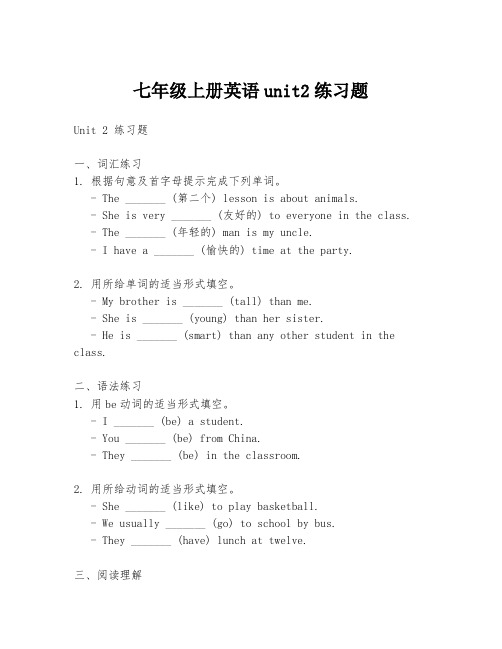
七年级上册英语unit2练习题Unit 2 练习题一、词汇练习1. 根据句意及首字母提示完成下列单词。
- The _______ (第二个) lesson is about animals.- She is very _______ (友好的) to everyone in the class. - The _______ (年轻的) man is my uncle.- I have a _______ (愉快的) time at the party.2. 用所给单词的适当形式填空。
- My brother is _______ (tall) than me.- She is _______ (young) than her sister.- He is _______ (smart) than any other student in the class.二、语法练习1. 用be动词的适当形式填空。
- I _______ (be) a student.- You _______ (be) from China.- They _______ (be) in the classroom.2. 用所给动词的适当形式填空。
- She _______ (like) to play basketball.- We usually _______ (go) to school by bus.- They _______ (have) lunch at twelve.三、阅读理解Read the following passage and answer the questions.Tom is a middle school student. He has a happy family. His father is a teacher and his mother is a doctor. Tom has a younger sister, Lucy. She is in the first grade. Tom likes to play basketball and he is good at it. His favorite subject is English because he thinks it's interesting. He has many friends at school.Questions:1. What is Tom's father's job?2. What does Tom like to do in his free time?3. What is Tom's favorite subject?4. Why does Tom like English?5. What grade is Lucy in?四、完形填空Read the following passage and choose the best word to complete it.My name is Lily. I am a student in Grade 7. I have a good friend named Bob. Bob and I are in the same class. We both like (1) _______ music. We often (2) _______ songs together. Bob is very (3) _______ and he always helps me with my homework. I think he is a (4) _______ friend.1. A. listen to B. listening to C. listens to D. listened to2. A. sing B. sings C. singing D. sang3. A. helpful B. help C. helps D. helped4. A. good B. better C. best D. well五、写作练习Write a short paragraph about your best friend. Include information about their appearance, personality, and hobbies.请注意,这些练习题是为了帮助学生复习和巩固Unit 2的学习内容。
Unit 2 World English A Blessing or a Curse
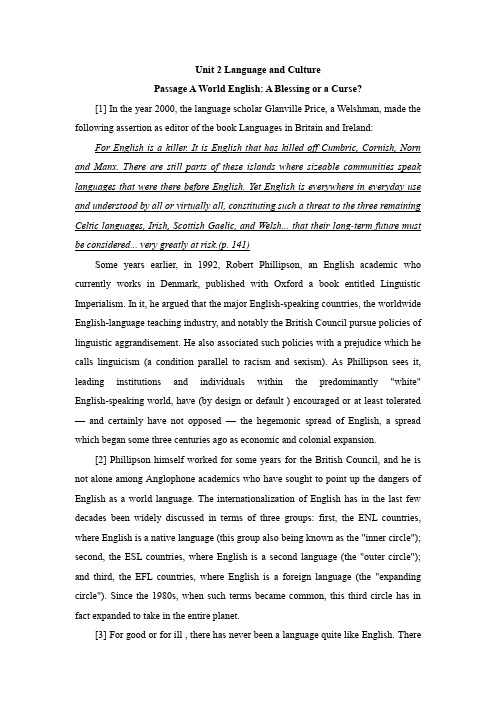
Unit 2 Language and CulturePassage A World English: A Blessing or a Curse?[1] In the year 2000, the language scholar Glanville Price, a Welshman, made the following assertion as editor of the book Languages in Britain and Ireland: For English is a killer. It is English that has killed off Cumbric, Cornish, Norn and Manx. There are still parts of these islands where sizeable communities speak languages that were there before English. Yet English is everywhere in everyday use and understood by all or virtually all, constituting such a threat to the three remaining Celtic languages, Irish, Scottish Gaelic, and Welsh... that their long-term future must be considered... very greatly at risk.(p. 141)Some years earlier, in 1992, Robert Phillipson, an English academic who currently works in Denmark, published with Oxford a book entitled Linguistic Imperialism. In it, he argued that the major English-speaking countries, the worldwide English-language teaching industry, and notably the British Council pursue policies of linguistic aggrandisement. He also associated such policies with a prejudice which he calls linguicism (a condition parallel to racism and sexism). As Phillipson sees it, leading institutions and individuals within the predominantly "white" English-speaking world, have (by design or default ) encouraged or at least tolerated — and certainly have not opposed — the hegemonic spread of English, a spread which began some three centuries ago as economic and colonial expansion.[2] Phillipson himself worked for some years for the British Council, and he is not alone among Anglophone academics who have sought to point up the dangers of English as a world language. The internationalization of English has in the last few decades been widely discussed in terms of three groups: first, the ENL countries, where English is a native language (this group also being known as the "inner circle"); second, the ESL countries, where English is a second language (the "outer circle"); and third, the EFL countries, where English is a foreign language (the "expanding circle"). Since the 1980s, when such terms became common, this third circle has in fact expanded to take in the entire planet.[3] For good or for ill , there has never been a language quite like English. Therehave been many "world languages", such as Arabic, Chinese, Greek, Latin, and Sanskrit. By and large , we now view them as more or less benign, and often talk with admiration and appreciation about the cultures associated with them and what they have given to the world. And it is fairly safe to do this, because none of them now poses much of a threat.[4] English however is probably too close for us to be able to analyze and judge it as dispassionately as we may now discuss the influence of Classical Chinese on East Asia or of Classical Latin on Western Europe. The jury is still out in the trial of the English language, and may take several centuries to produce its verdict , but even so we can ask, in this European Year of Languages, whether Price and Phillipson are right to warn us all about the language that I am using at this very moment.[5] It certainly isn't hard to look for situations where people might call English a curse. An example is Australia, which is routinely regarded as a straightforward English-speaking country. The first Europeans who went there often used Latin to describe and discuss the place. The word Australia itself is Latin; evidently no one at the time thought of simply calling it "Southland" (which is what Australia means). In addition, in South Australia there is a wide stretch of land called the Nullarbor Plains, the first word of which sounds Aboriginal , but nullarbor is Latin and means "no trees". And most significantly of all, the early settlers called the continent terra nullius. According to the Encarta World English Dictionary (1999) the Latin phrase terra nullius means:...the idea and legal concept that when the first Europeans arrived in Australia the land was owned by no one and therefore open to settlement. It has been judged not to be legally valid.But that judgment was made only recently. When the Europeans arrived, Australia was thinly populated — but populated nonetheless — from coast to coast in every direction. There were hundreds of communities and languages. Many of these languages have died out, many more are in the process of dying out, and these dead and dying languages have been largely replaced by either kinds of pidgin English or general Australian English. Depending on your point of view, this is either a tragicloss or the price of progress.[6] At the same time, however, can the blame for the extinction of Aboriginal languages be laid specifically at the door of English? The first Europeans to discover Australia were Dutch, and their language might have become the language of colonization and settlement. Any settler language could have had the same effect. If for example the Mongols had sustained their vast Eurasian empire, Mongolian might have become a world language and gone to Australia. Again, if history had been somewhat different, today's world language might have been Arabic, a powerful language in West Asia and North Africa that currently affects many smaller languages, including Copticand Berber. Spanish has adversely affected indigenous languages in so-called "Latin" America, and Russian has spread from Europe to the Siberian Pacific. If English is a curse and a killer, it may only be so in the sense that any large language is likely to influence and endanger smaller languages.[7] Yet many people see English as a blessing. Let me leave aside here the obvious advantages possessed by any world language, such as a large communicative network, a strong literary and media complex, and a powerful cultural and educational apparatus. Let us instead look at something rather different: the issue of politics, justice, and equality. My object lesson this time is South Africa. Ten years ago, South Africa ceased to be governed on principles of racial separateness, a system known in Afrikaans (a language derived from Dutch) as apartheid. The system arose because the Afrikaner community- European settlers of mainly Dutch descent- saw themselves as superior to the indigenous people of the land they had colonized. English-speaking South Africans of British descent were not particularly strong in opposing the apartheid regime, and the black opposition, whose members had many languages, was at first weak and disorganized. However, the language through which this opposition gained strength and organization was English, which became for them the key language of freedom and unity, not of oppression. There are today eleven official languages in South Africa — English, Afrikaans, and nine vernacular languages that include Zulu, Ndebele, and Setswana. But which of these nine do black South Africans use (or plan to use) as their national lingua franca? Which do they wish theirchildren to speak and write successfully (in addition to their mother tongues)? The answer is none of the above. They want English, and in particular they want a suitably Africanized English.[8]So, a curse for the indigenous peoples of Australia and something of a blessing for those in South Africa…[9] How then should we think of English in our globalizing world with its endangered diversities? The answer, it seems to me, is crystal clear. Like many things, English is at times a blessing and at times a curse- for individuals, for communities, for nations, and even for unions of nations. The East Asian symbolism of yin and yang might serve well here: There is something of yang in every yin, of yin in every yang. Although they are opposites, they belong together: in this instance within the circle of communication. Such symbolism suggests that the users of the world's lingua franca should seek to benefit as fully as possible from the blessing and as far as possible avoid invoking the curse.。
- 1、下载文档前请自行甄别文档内容的完整性,平台不提供额外的编辑、内容补充、找答案等附加服务。
- 2、"仅部分预览"的文档,不可在线预览部分如存在完整性等问题,可反馈申请退款(可完整预览的文档不适用该条件!)。
- 3、如文档侵犯您的权益,请联系客服反馈,我们会尽快为您处理(人工客服工作时间:9:00-18:30)。
<P1>Dickens might have created Charlie Chaplin's childhood.
But only Charlie n could have created the great <2>comic</2> character of "the Tramp", the little man in <3>rags</3> who gave his creator permanent fame.
He was born in a poor area of South London.
He wore his mother's old red stockings cut down for <1>ankle</1> socks.
His mother was temporarily declared mad.
<P7>He already had the urge to explore and extend a talent he discovered in himself as he went along.
"It can't be me. Is that possible? How <19>extraordinary</19>," is how he greeted the first sight of himself as the Tramp on the screen.
He <14>postponed</14> that day as long as possible: In <em>Modern Times</em> in 1936, the first film in which he was heard as a singing waiter, he made up a <15>nonsense</15> language which sounded like no known nationality.
This physical transformation, plus the skill with which he <23>executed</23> it again and again, is surely the secret of Chaplin's great comedy.
He also had a deep need to be loved—and a corresponding fear of being <24>betrayed</24>.
The Tramp never loses his faith in the flower girl who'll be waiting to walk into the <26>sunset</26> with him; while the other side of Chaplin makes Monsieur Verdoux, the French wife killer, into a symbol of hatred for women.
He was an <18>immensely</18> talented man, determined to a degree unusual even in the ranks of Hollywood stars.
His huge fame gave him the freedom—and, more importantly, the money—to be his own master.
He later said he imagined the Tramp to be a college-educated gentleman who'd come down in the world.
But if he'd been able to speak with an educated accent in those early short comedies, it's <16>doubtful</16> if he would have achieved world fame.
Sad to say, many English people in the 1920s and 1930s thought Chaplin's Tramp a bit, well, "<7>crude</7>".
<P3>Certainly middle-class audiences did; the working-class audiences were more likely to <8>clap</8> for a character who <9>revolted</9> against authority, using his wicked little cane to trip it up, or aiming the <10>heel</10> of his boot for a well-placed kick at its broad rear.
Then again, <P5>the Tramp's quick eye for a pretty girl had a <12>coarse</12> way about it that was considered, well, not quite nice by English audiences—that's how foreigners behaved, wasn't it?
And the English would have been sure to find it "odd". No one was certain whether Chaplin did it on purpose but this helped to bring about his huge success.
<P9>The two were hard to combine and sometimes—as in his early marriages—the <25>collision</25> between them resulted in disaster.
Yet even this painfully-bought self-knowledge found its way into his comic creations.
Other countries—France, Italy, Spain, even Japan—<P2>have provided more <4>applause</4> (and profit) where Chaplin is concerned than the land of his birth.
But that shock <20>roused</20> his imagination.
Chaplin didn't have his jokes written into a <21>script</21> in advance; he was the kind of comic who used his physical senses to invent his art as he went along.
<P6>But for over half of his screen career, Chaplin had no screen voice to confirm his British <13>nationality</13>.
Indeed, it was a headache for Chaplin when he could no longer resist the talking movies and had to find "the right voice" for his Tramp.
<P8>Lifeless objects especially helped Chaplin make "contact" with himself as an artist.
He turned them into other kinds of objects.
Thus, a broken alarm clock in the movie <em>The Pawnbroker</em> became a "sick" patient undergoing surgery; boots were boiled in his film <em>The Gold Rush</em> and their soles eaten with salt and <22>pepper</22> like prime cuts of fish (the nails being removed like fish bones).
